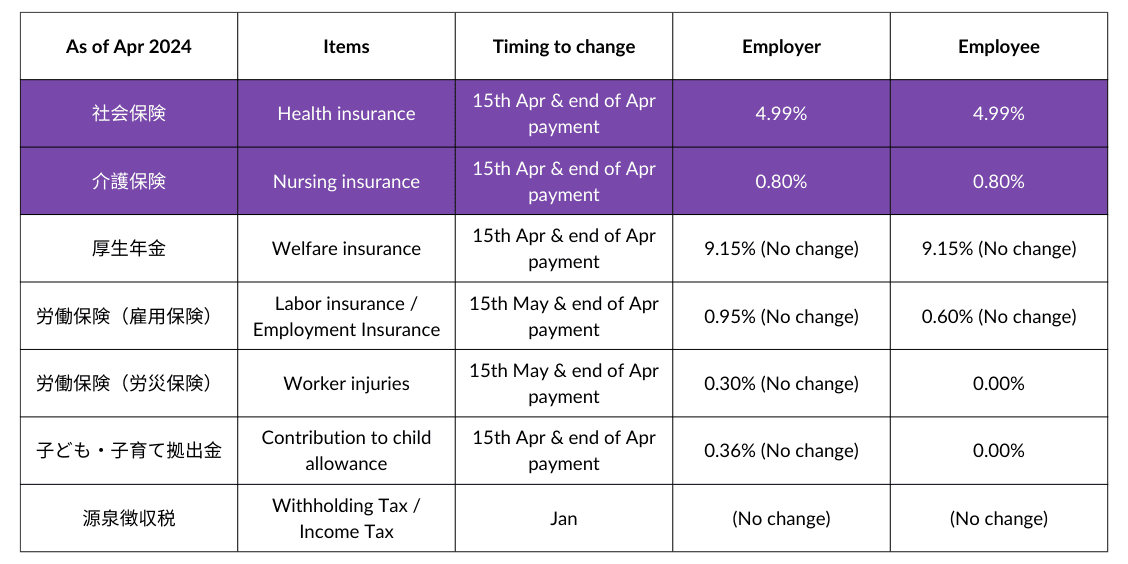Table of Contents
ToggleWe’ve outlined Japan statutory updates for 2024
Effective November 2024
Japan Expands eVISA Eligibility
Japan has broadened its electronic visa (eVISA) system to include nationals residing in Hong Kong, India, Indonesia, Macao, Mongolia, and South Korea, excluding regions managed by the Consulate General of Japan in Jeju. Eligible applicants can now apply online for single-entry short-term stay visas for tourism purposes.
Key Details:
- The eVISA permits a stay of 15 or 30 days, depending on nationality and travel purpose.
- For Chinese nationals, the eVISA allows a 15-day stay for tourism.
- For Vietnamese nationals, additional conditions may apply for the 15-day visa, such as proof of financial capacity or travel purpose verification.
Source: BAL
Effective October 2024
More Part-time Employees are Eligible for Pension Insurance
Act No. 115 of 1954, the Amended Employees’ Pension Insurance Act, will go into effect on October 1, 2024. The coverage of Employee Pension Insurance for part-time workers will be increased to the point that employers with 51 or more employees covered by the programme will need part-time workers to join the plan. The plan was only available to part-time employees who worked 20 hours or more a week at businesses with 101 or more employees who were covered by employee pension insurance prior to the change.
Source: Paul Hastings
Effective July 2024
2024 Income Tax Reform and Reductions
The fiscal year 2024 tax reform outline details significant proposed changes and revisions.
The reforms align with the Japanese government’s economic strategy to foster growth and productivity through investments in human resources, science, technological innovations, start-ups, and “green” and digital transformations.
Additionally, the outline includes tax incentives to support these investments, measures to prevent tax abuse, updates related to national and global developments, and ongoing discussions on BEPS (Base Erosion and Profit Shifting) implementation.
Corporate Taxation Overview
- Tax Credit for Domestic Production in Strategic Sectors
To stimulate economic growth, Japan will introduce tax credits to promote domestic production in sectors requiring long-term strategic investment, such as green and digital transformation. This includes goods like electric vehicles, green steel and chemicals, sustainable aviation fuel, and semiconductors. The tax credit, available for ten years from the approval date under the amended Industrial Competitiveness Enhancement Act (until March 31, 2027), will be the lesser of the goods’ sales quantity or the acquisition cost of production facilities. The credit caps at 40% (20% for semiconductors) of corporate tax liability, with a carry-forward period of four years (three for semiconductors). Wage and capital investment thresholds must be met to qualify. - Innovation Box Regime
A new “Innovation Box” regime will provide a 30% income deduction for qualified income from patents and copyrights related to AI technology developed in-house. This will apply to patents and copyrights acquired or produced after April 1, 2024, with the income from these assets eligible from April 1, 2025, to March 31, 2032. The regime aims to boost intangible asset investments but will limit R&D tax credits for companies using this incentive. - Tax Incentives for Wage Increases
Large enterprises that increase wages by at least 7% annually can receive a corporate tax credit of 25% of the wage increase. Additional credits are available for companies promoting women’s initiatives and childcare support, with caps at 35% for large and medium-sized companies and 45% for SMEs. Unused credits can be carried forward for five years. - Carbon Neutral Investment Tax Credit
The tax credit for carbon neutrality investments is extended. Businesses with certified Business Adaptation Plans by March 31, 2026, and using qualifying assets within three years can benefit. The required carbon productivity improvement rate is now 15% (10% for SMEs), up from 7%. - Revised Size-Based Enterprise Tax
Companies previously subject to size-based enterprise tax (those with capital over JPY 100 million) will continue to be taxed even if capital is reduced below this threshold, if combined capital and surplus exceed JPY 1 billion. This rule takes effect on April 1, 2025. - Other Corporate Tax Revisions
- Long-term crypto assets held by non-issuers are exempt from mark-to-market valuation if specific conditions are met.
- The spin-off tax rules for partial spin-offs will be extended by four years.
- The open innovation tax incentive period is extended by two years.
- Reserves for SME business reorganization investment losses will be expanded.
- Non-applicability measures for specific tax credits will become stricter.
- The maximum deductible for certain food and beverage expenses will increase from JPY 5,000 to JPY 10,000 per person.
International Taxation Overview
- Global Minimum Tax
The Income Inclusion Rule (IIR), introduced in the 2023 tax reform, will be reviewed as needed. The OECD’s discussions on the Qualified Domestic Minimum Top-up Tax (QDMTT) in 2024 may lead to new legislation in the 2025 tax reform. - Crypto Asset Transaction Reporting for Non-Residents
A new system will require domestic crypto asset transaction businesses to report non-residents’ transactions to tax authorities. This will facilitate automatic information exchange with other countries’ tax authorities and prevent international tax evasion involving crypto assets. - Other International Tax Revisions
- CFC Rules: The criteria for exempting foreign affiliates from being considered “paper companies” under the Controlled Foreign Company (CFC) rules will be revised. If a CFC has no income in a tax year, income percentage determination will no longer be necessary for exemption.
- Intangible Asset Transfers: Domestic transfers of intangible assets to a foreign company’s head office will not be treated as qualified in-kind contributions. Regulations on the attribution of transferred assets will also be revised.
- Excess Interest Carry-Forward: The carry-forward period for excess interest under earnings stripping rules will extend from seven to ten years.
- Subsidiary Shares: Special measures for reducing the book value of subsidiary shares will be revised.
Consumption Taxation Overview
- Platform Operators
A new system will require platform operators to remit consumption taxes on behalf of foreign digital service businesses. This applies to platform operators of a certain scale providing services to foreign businesses with Japanese customers. - Small Business Exemption
Revisions will be made to prevent tax avoidance by businesses misusing the small business exemption or simplified calculation rules. - Export Exemption for Foreign Tourists
The consumption tax exemption for foreign tourists will be revised so that only purchases confirmed by Japanese customs as being taken out of Japan will qualify. This change will be detailed in the 2025 tax reforms.
Individual Income Taxation, Asset Taxation, and Tax Administration Overview
- Individual Income Taxation
- Flat-Rate Tax Reduction: A new flat-rate tax reduction of JPY 30,000 for income tax and JPY 10,000 for inhabitant tax per person will be introduced. This applies to taxpayers, spouses, and dependents, subject to an income limit.
- Child Allowances and Dependent Deductions: Eligibility for child allowances will expand to include high school-aged children, while the dependent deduction for children aged 16 to 18 will be reduced.
- Housing Loan Tax Credit: The planned reduction in the housing loan tax credit limit will be postponed for 2024, applicable only to young married couples and families with children.
- Stock Option Tax Incentives: The upper limit of the exercise price eligible for tax incentives under the stock option rules will increase from JPY 12 million to JPY 36 million under certain conditions.
- Asset Taxation
- Fixed Asset Tax Adjustment: The burden adjustment measure for fixed asset taxes will be extended through fiscal years 2024 to 2026.
- Business Succession Tax Rules: The deadline for submitting the specially approved succession plan under the business succession tax rules will be extended by two years, until March 31, 2026.
- Tax Administration
- Penalties for Concealment or Falsification: Requests for corrections based on acts of concealment or falsification will now be subject to heavy additional (penalty) taxes.
- Secondary Tax Liability for Fraudulent Representatives: Measures will be implemented to impose secondary national tax liability on company representatives who commit fraud and disperse company assets to evade tax obligations, under certain conditions.
Source: MOF
Effective April 2024
Amendments to the Labour Standards Act
The amendments to the Labour Standards Act that were ratified last March 2023 will now take effect starting April 1 of this year. This amendment specifically concerns the notification of the working conditions for employees, allowing for greater transparency. The scope of this change includes:
Transparent communication regarding workplace and job function changes
Employers are now required to clearly specify any changes regarding the employment site and business scope to their workers. This includes both immediate adjustments and other future changes.
Explanation on the limitations of renewing fixed-term contracts
It is the employer’s responsibility to disclose the renewal restrictions of fixed-term contracts, highlighting either the permissible number of renewals or the total allowable contract duration.
Clear stipulation of conversion rights
Workers under fixed-term agreements should be afforded the opportunity to request a shift to indefinite-term contracts, with employers outlining the necessary criteria and procedures for such a transition.
Specifications following the transition to indefinite-term contracts
Upon a worker’s successful conversion to an indefinite-term contract, employers must detail the conditions of employment that will subsequently apply.
Source: Lexology
Effective March 2024
Digital Nomad Visa
Digital Nomad Visa is now open for applications, following an earlier announcement this year about the program. The visa allows eligible foreign nationals (and family members) to reside in Japan while working remotely for their home employer for a non-renewable period of up to six months as long as they utilise information and communication technology in their position.
Expansion of Specified Skilled Worker Program
The Japanese government resolved to further expand the coverage of the Specified Skilled Worker program by expanding the program to four additional industries (for a new total of 16 industries) where there are strong demands for foreign employees due to acute labor shortages. The new sectors included are: automotive transportation, railroads, forestry and timber.
Source: Fragomen
Health and Nursing Care Insurance Reduced
The Japanese government has announced anticipated changes to the social contribution rates, which will impact both employers and employees. The update is aimed at improving the social welfare system in Japan and enhancing the country’s economic growth.
Here are some key details:
- Health Insurance (Employer and Employee) from 5.0% to 4.99%
- Nursing Care Insurance (Employer and Employee) (applicable only for age 40–64) from 0.91% rate to 0.80%
Please find the updated social rates and tax table below:
Featured photo by Ryo Yoshitake on Unsplash







